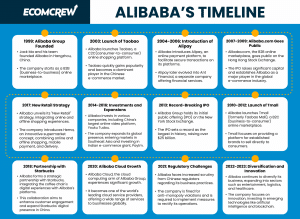How Alibaba Makes Money: The Mechanisms of a Giant

In the ever-evolving landscape of e-commerce and technology, Alibaba Group has emerged as a global giant and one of the top e-commerce platforms in Asia and the world. Founded by the visionary Jack Ma, this Chinese conglomerate has redefined the way people buy and sell goods and services online. Alibaba boasted a complex and diversified revenue model that extended far beyond its e-commerce roots. In this article, we'll delve into the intricacies of how Alibaba makes money, exploring its various revenue streams, key subsidiaries, and the strategies that have fueled its success.
The Foundations of Alibaba's Success
Before we dissect Alibaba's revenue model, let's briefly explore its origins and the challenges it overcame to become a tech behemoth.
Alibaba's History
Jack Ma, a former English teacher, co-founded Alibaba Group in 1999 with a vision to create a digital marketplace that would connect Chinese manufacturers with global buyers. His journey from humble beginnings to becoming one of the world's most prominent tech entrepreneurs is an inspirational story of determination and unwavering belief in the power of the internet. If you want a quick dose of inspiration, you can read about some of our favorite Jack Ma quotes.
Early Challenges
During its infancy, Alibaba faced skepticism and financial constraints. However, the company persevered, and in 2003, it launched Taobao, a consumer-focused online marketplace. Taobao's innovative approach to e-commerce, including its free listings for sellers, disrupted the Chinese e-commerce landscape and set the stage for Alibaba's meteoric rise.
Alibaba's Revenue Streams
Alibaba's revenue model is a multifaceted ecosystem that encompasses various sectors and services. Here are the primary revenue streams that contribute to Alibaba's financial success:
Core Commerce
How It Works: Alibaba's core revenue driver is its e-commerce platforms, primarily Taobao and Tmall. These platforms facilitate online shopping for consumers and provide a marketplace for businesses to reach customers.
Revenue Generation: Alibaba generates revenue through several means, including:
- Commissions: Merchants pay Alibaba commissions on their sales through the platform.
- Marketing Services: Merchants can purchase advertising and promotional services to increase visibility within Alibaba's ecosystem.
- Membership Fees: Tmall charges brands and sellers an annual fee for access to its premium services and customer base.
For our more shopping-centric readers, we have a comprehensive guide on how to get the best deals out of Alibaba.
Cloud Computing
How It Works: Alibaba Cloud, also known as Aliyun, offers a wide range of cloud computing and data services, including hosting, data storage, artificial intelligence, and more.
Revenue Generation: Alibaba Cloud's revenue model relies on a subscription-based system, where customers pay for the services and resources they use. This includes fees for data storage, computing power, and other cloud-related services.
Daniel Zhang, the outgoing chairman and CEO of Alibaba, has stepped down from his position running the company’s cloud division and has just been replaced by Eddie Yongming Wu on September 11, 2023. In a recent statement, Wu has positioned Alibaba’s strategic focuses going forward as “user first” and “AI-driven”.
This is of great interest since Alibaba’s generative artificial intelligence model, Tongyi Qianwen, is the group’s second biggest source of revenue after its e-commerce platforms.
Digital Media and Entertainment
How It Works: Alibaba's digital media and entertainment division includes businesses like Youku (a video streaming platform), Alibaba Pictures (film production and distribution), and Alibaba Music.
Revenue Generation: Alibaba generates revenue in this sector through subscriptions, advertising, content licensing, and online ticketing for events and movies.
Innovation Initiatives and Others
How It Works: This category encompasses various innovative projects and emerging businesses, including Alibaba's efforts in new retail, logistics, and local services.
Revenue Generation: Alibaba invests in these initiatives to foster innovation and expand its ecosystem. Revenue is generated through a combination of sources, such as service fees, advertising, and commissions.
International Commerce
How It Works: Alibaba's international commerce segment focuses on helping Chinese businesses export their products to global markets through platforms like Alibaba.com.
Revenue Generation: Alibaba earns revenue through membership fees, transaction fees, and value-added services provided to international merchants.
Alibaba's Key Subsidiaries and Investments
Alibaba's reach extends beyond its primary revenue streams. The company has strategically invested in a wide range of businesses, both in China and abroad. Some of its notable subsidiaries and investments include:
3.1 Ant Group (formerly Ant Financial)
Alibaba's financial affiliate, Ant Group, operates Alipay, one of China's leading digital payment platforms. While Ant Group operates independently, its success is closely tied to Alibaba's ecosystem.
Lazada
Alibaba holds a significant stake in Lazada, an e-commerce platform that serves Southeast Asian markets. This investment strengthens Alibaba's presence in the region.
3Cainiao Network
Cainiao Network is Alibaba's logistics subsidiary, focused on optimizing and enhancing the efficiency of the company's supply chain and delivery network.
Ele.me
Alibaba acquired Ele.me, a food delivery platform, to compete in the highly competitive online food delivery market in China.
AliExpress
AliExpress, part of the Alibaba Group, serves as a global marketplace that allows Chinese sellers to reach international consumers.
Alibaba's Strategies for Success
Alibaba's journey to becoming a tech giant is underpinned by several strategic initiatives:
Ecosystem Expansion
Alibaba continually expands its ecosystem by investing in and acquiring businesses that complement its core services. This strategy fosters user engagement and keeps customers within the Alibaba ecosystem for longer periods.
International Expansion
While Alibaba's core market is China, the company has made significant efforts to expand internationally. Investments in Lazada, AliExpress, and other global platforms have allowed Alibaba to tap into international markets.
Diversification
Alibaba's diversification into cloud computing, digital media, logistics, and financial services reduces its reliance on any single revenue stream and positions it as a comprehensive technology conglomerate.
Data Utilization
Alibaba leverages data analytics and artificial intelligence to gain insights into customer behavior and market trends. This data-driven approach informs its strategies and enhances user experiences.
What's Next for Alibaba?
Recently, Alibaba has been navigating a changing regulatory landscape in China. Antitrust concerns and regulatory actions posed challenges to the company's growth. However, Alibaba's commitment to innovation and its expanding global footprint indicated resilience and adaptability.
The future of Alibaba hinges on its ability to address regulatory issues, continue expanding internationally, and capitalize on emerging technologies. The company's diversified revenue model and strategic investments position it well to weather challenges and remain a dominant force in the tech and e-commerce industry.
Conclusion
Alibaba's revenue model is a testament to its adaptability and visionary leadership. From its roots in e-commerce to its forays into cloud computing, entertainment, and finance, Alibaba has created a diverse and interconnected ecosystem. By strategically investing in key subsidiaries and pursuing innovative initiatives, Alibaba has not only weathered challenges but also set the stage for future growth. As the company continues to navigate a dynamic global landscape, its ability to innovate and evolve will determine its trajectory in the years to come.








